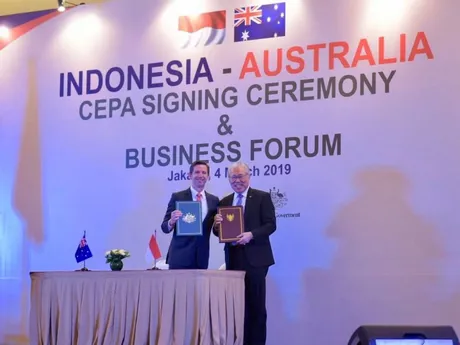The National Farmers' Federation says there are wide-ranging wins for Australian farmers, including the fruit and vegetable sector, following the much-anticipated Indonesia-Australia Comprehensive Economic Partnership Agreement (IA-CEPA), which was completed in Jakarta.
National Farmers’ Federation CEO Tony Mahar accompanied Federal Trade Minister Simon Birmingham to Indonesia for the signing, and says Australian agriculture already enjoyed a valuable trade relationship with Indonesia, but this agreement will provide a major boost.
"Today represents real tangible benefits to the hip pocket of many Australian farmers," he said. "In 2017, almost half (49.5 per cent) of our food and fibre exports went to Indonesia, valued at $3.5 billion."

Photo: Signing of the IA-CEPA (source: Simon Birmingham's Twitter)
However, Mr Mahar said international competitors increasingly challenged Australian agriculture’s market share in Indonesia.
"In many instances, IA-CEPA will strengthen Australia’s role as the preferred supplier to the burgeoning south-east Asian economy," Mr Mahar said. "Carrots, Australia’s largest vegetable export, are at the forefront of the agreement with tariffs to be cut to 10 per cent, down from 25 per cent, for 5000 tonnes per year, increasing to 10,000 tonnes after 10 years, and tariffs eliminated after 15 years. The tariff relief represents an extra $5 million to $10 million to Australia’s fresh vegetable exports per annum."
Mr Mahar said it was now up to the Australian Parliament to ensure the landmark trade agreement was ratified.
"Enhancing Australia’s agricultural exports must have the support of the whole Parliament," he said. "It is a matter of significant national importance that free trade agreements, like IA-CEPA, some eight years in the making and the on-foot, Peru-Australia FTA, enjoy bipartisan support and rapid passage through both Houses. In the face of drought and floods, it is vital that the future interests of farmers are not compromised by short-term partisan politics."
The NFF is supported by the Government and the Opposition, in its vision for agriculture to achieve a farm gate output of $100 billion by 2030 – up from the current $60 billion.
"More than 70 per cent of Australia’s agricultural production is exported," Mr Mahar said. "Breaking down tariff and non-tariff barriers and expanding market access is therefore a key priority in the NFF’s Roadmap to achieve $100 billion. A stronger agricultural sector means more jobs, more jobs mean more sustainable, more vibrant regional communities and an overall stronger national economy."
Agriculture wins in IA-CEPA:
- Carrots: Tariff cut immediately to 10% (from 25%) for 5,000 tonnes per year; tariff further reduced over time, down to 0% after 15 years for an unlimited volume.
- Citrus: Improved access for key Australian citrus exports:
Mandarins – tariff cut immediately to 10% (from 25%) for 7,500 tonnes per year; tariff further reduced over time, down to 0% after 20 years for an unlimited volume. - Oranges – duty free access for 10,000 tonnes of oranges per year, increasing 5% each year.
- Lemons and limes – duty free access for 5,000 tonnes of lemons and limes per year, increasing 2.5% each year.
- Potatoes: Tariff cut immediately to 10% (from 25%) for 10,000 tonnes per year; after five years tariff further reduced to 5% for 12,500 tonnes per year, increasing by 2.5% per year.

For more information:
National Farmers Federation
Phone: +61 2 6269 5666
www.nff.org.au
